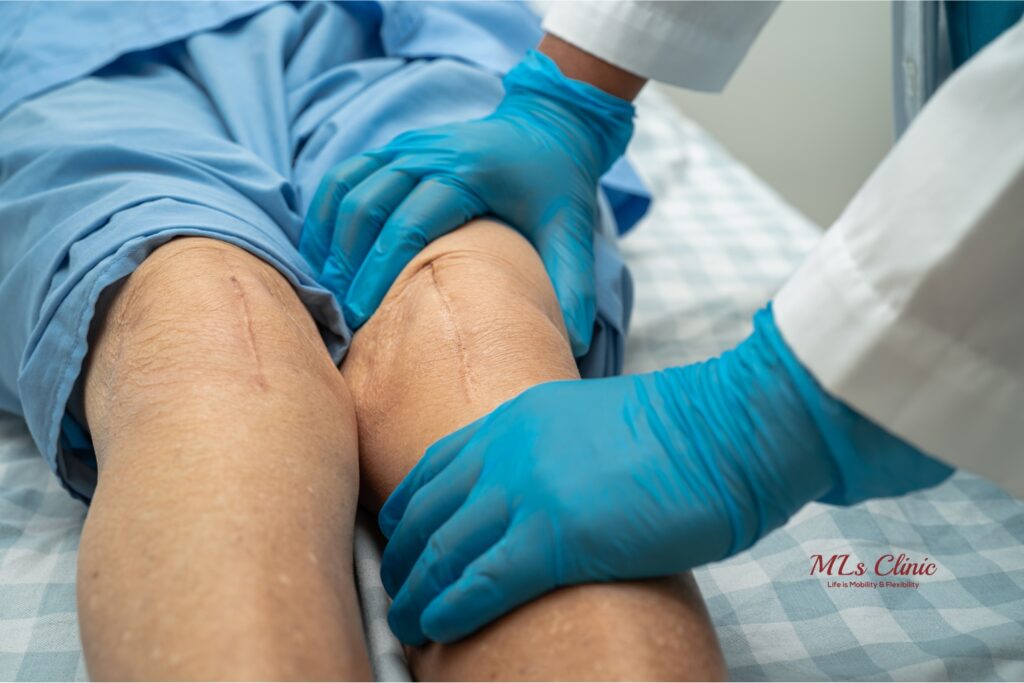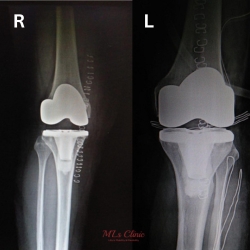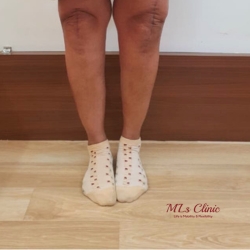The Benefits and Risks of Bilateral Total Knee Replacement: What You Need to Know

Benefits and Risks of Bilateral Total Knee ReplacementOverview
Arthritis refers to joint inflammation, which can affect one or multiple joints, leading to pain and stiffness. In the knees, this typically indicates that the cartilage in the joints has deteriorated. Bilateral Total Knee replacement surgery is an option to replace the damaged joints and alleviate symptoms.
During the procedure, Best Knee Replacement Surgeon in Indore, who is Dr. Preetesh Choudhary at MLs Clinic, replaces the damaged knee joint with an artificial knee, or prosthesis, which is made from metal, polyethylene, and ceramic materials. This prosthesis helps restore nearly full knee function and relieves arthritis pain.
damaged knee joint with an artificial knee, or prosthesis, which is made from metal, polyethylene, and ceramic materials. This prosthesis helps restore nearly full knee function and relieves arthritis pain.
Bilateral knee replacement, also known as bilateral knee arthroplasty, is a surgery where the damaged or worn-out parts of both knees are removed and replaced with artificial joints. These artificial knee joints are typically made from metal, ceramic, or polyethylene and include components that replace both the femur (thigh bone) and the tibia (shin bone).
Top Orthopedic surgeons usually recommend knee replacement surgery when knee pain interferes with daily activities and diminishes quality of life. This surgery is most often performed on individuals over the age of 60, as younger patients tend to wear out the artificial knee faster.
For individuals with severe arthritis in both knees, double knee replacement surgery may be considered. However, this procedure carries higher risks and is typically recommended only for those who are:
- physically fit,
- in good overall health, and
- motivated to undergo physical therapy and rehabilitation post-surgery to regain mobility.
Types of Bilateral Total Knee Replacement
There are two types of double knee replacement surgeries:
-
Simultaneous Bilateral Knee Replacement
In simultaneous bilateral knee replacement, both knees are replaced in the same surgery. The main benefit is that you only need one hospital stay and one recovery period for both knees.
As said by the Best Knee Replacement Surgeon in Indore, Dr. Preetesh Choudhary, recovery may be slower because it’s harder to use both knees at once. Many people need help at home during their recovery.
This surgery also takes longer, usually around three to four hours, compared to about two hours for a staged procedure. Since it requires more time and anesthesia, there’s a higher risk of complications. People with heart or lung conditions are generally not recommended for this surgery due to the potential for heart issues or excessive blood loss.
-
Staged Bilateral Knee Replacement
In staged bilateral knee replacement, each knee is replaced at different times, a few months apart. Each surgery takes about two hours, allowing one knee to heal before the other is operated on.
The biggest benefit of this approach is a lower risk of complications and a shorter hospital stay for each surgery.
However, because it involves two surgeries, the total recovery time is longer, which might delay your return to regular activities.
In either type of surgery, knee replacement surgeon, Dr. Preetesh Choudhary can do a total knee replacement or a partial knee replacement on one or both knees.
Benefits of Bilateral Total Knee Replacement
A double knee replacement, or bilateral knee replacement, involves replacing both knees in a single surgery.
This procedure offers several advantages over having two separate knee replacements, including:
- Shorter time off work: Patients only need one recovery period instead of two.
- Less time in the hospital: With only one hospital stay, patients save both time and money.
- Shorter physical therapy: Both knees can be rehabilitated at the same time.
- Lower cost: Double knee replacement surgery is 18-26% cheaper than having two separate surgeries, including out-of-pocket expenses.
Risks of Bilateral Knee Replacement
Bilateral knee replacement, whether done simultaneously or in stages, offers significant benefits for those with severe knee issues. However, it’s important to be aware of some risk factors:
- Blood Loss Management: Some patients may require a blood transfusion after surgery, especially with double knee replacements. This is closely monitored, and proactive measures ensure patient safety.
- Comprehensive Rehabilitation: Recovering from a double knee replacement might involve a short stay at a rehabilitation center, providing dedicated support and care. This helps with faster recovery and better mobility outcomes.
- Extended Surgery Time: Replacing both knees at once means spending more time under anesthesia, which is carefully managed by an experienced medical team to minimize risks.
- Equal Recovery for Both Legs: While there isn’t a “strong” leg to rely on post-surgery, both knees are addressed in one go, eliminating the need for a second surgery and recovery phase.
- Other Factors to Consider: Like all surgeries, there are risks of infection, blood clots, and complications such as heart attack or stroke. However, with proper medical guidance, these risks can be reduced.
Patients over the age of 60 may face a slightly higher risk of complications, with men being more prone than women. Nevertheless, with advancements in surgical techniques and post-op care, bilateral knee replacement can significantly improve quality of life for many.
Key Points
Bilateral Total Knee Replacement can offer significant advantages for patients with severe arthritis in both knees, including reduced recovery time and overall cost savings. However, it also comes with increased risks, such as a more challenging recovery and greater surgical complications. Being an orthopedic surgeon, I recommend that patients considering this procedure carefully weigh the benefits and risks with their Knee replacement surgeon. Being in good physical health, motivated for rehabilitation, and understanding the demands of recovery are key factors to ensure a successful outcome.






